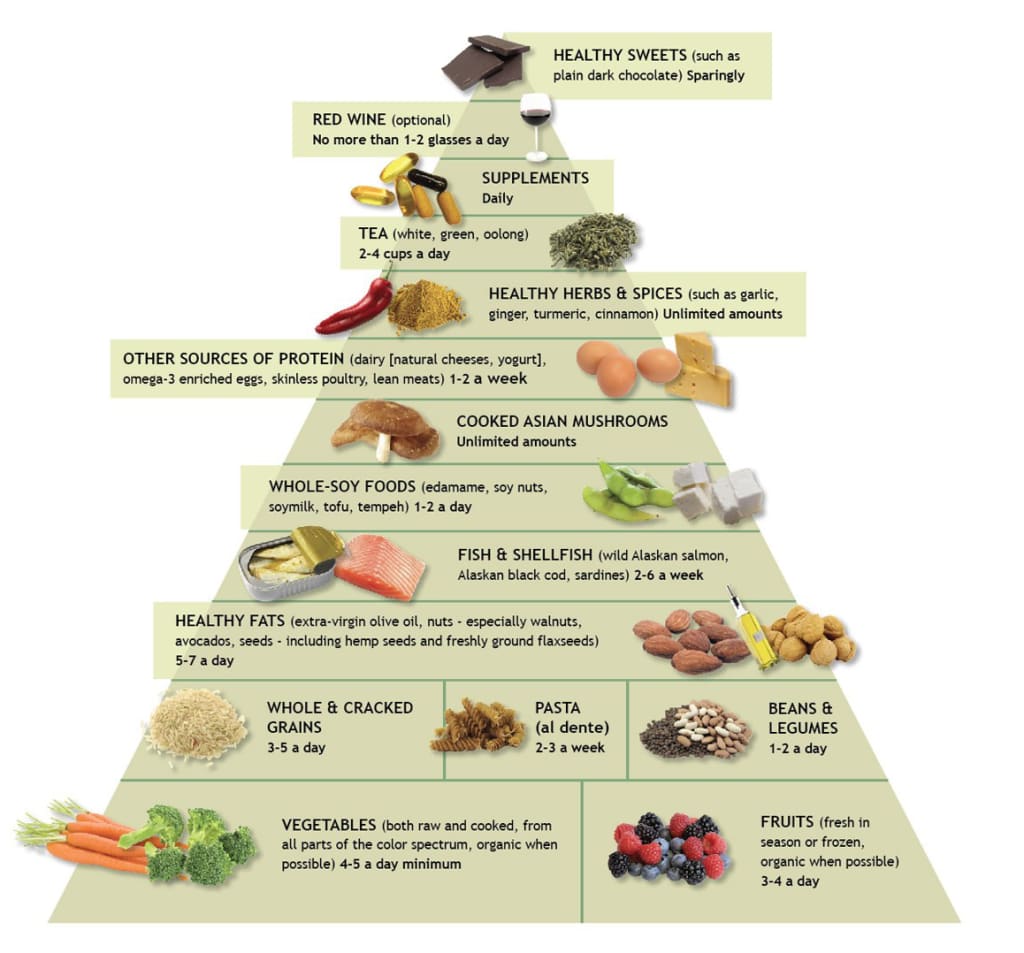Food as Therapy
Anti-Inflammatory Eating to Promote Better Health

There are countless diets purporting to help you lose weight, but what would happen if you were to approach eating from a health viewpoint rather than a weight loss viewpoint? I find the anti-inflammatory eating approach very interesting, because it's aimed at putting healthy things in the body to reduce levels of potentially harmful inflammation. It's sometimes called an anti-inflammatory diet, but I don't like the use of the term diet since that is so closely associated with attempts to lose weight.
There are multiple health conditions that involve excess inflammation in the body. Autoimmune conditions are perhaps the most obvious, but other conditions like heart disease and even depression have been associated with inflammation. Blood tests such as C-reactive protein can indicate that there are excessive inflammatory processes going on in the body. Medications can help treat the inflammatory medical condition, but it's also worth making dietary changes in order to promote the best possible overall health.
This was especially relevant to me because I have depression, which has been linked to inflammation, and I've also had elevations in C-reactive protein show up on blood rests. My naturopath recommended an anti-inflammatory eating approach, which led me to first start looking into it. I discovered it's actually quite similar to a Mediterranean diet and the kind of foods that are eaten in "blue zones," regions where people have an unusually long lifespan.
Pro-Inflammatory Foods to Avoid
Highly refined carbs have been stripped of the healthy parts of the grain, and the resulting product causes rapid spikes in blood sugar, which tends to promote inflammation. These highly processed carbohydrate sources include things like flour and white rice. Simple sugars, including high fructose corn syrup, are pervasive in processed foods, even those foods that you wouldn't necessarily expect to have sugar in them. Artificial sweeteners, although they are non-caloric, can still trigger inflammatory reactions. Stevia is a natural sugar alternative, but many commercially available stevia products actually contain large amounts of the sugar substitute xylitol.
As a broad rule of thumb, the more that has been done to a food product between the farm and your kitchen, the more likely it is to contain elements that do not promote health, or to be stripped of those elements that would normally promote health. Trans fats are found almost exclusively in processed foods, and have been linked to a number of negative health effects.
What an animal eats actually makes a difference to the resulting food product. Cows naturally feed on grass, but in commercial operations they are sent to feedlots where they're loaded up with corn or soy-based feed. Choosing grass-fed beef and dairy products is a better choice that can help to avoid some of the negative health outcomes that have been linked to eating large amounts of grain-fed beef. For people who are lactose intolerant, some dairy products can promote inflammation, so the inclusion of dairy will be a very individual choice.
Anti-Inflammatory Foods to Include
Dr. Andrew Weil's anti-inflammatory food pyramid is a useful place to begin. Fruits and veggies form the base of the pyramid. They are packed with fiber, which helps to slow absorption from the gut and decrease spikes in blood sugar. They also have a variety of phytochemicals, which are nutrients found specifically in plants. Many have antioxidants, which scavenge harmful free radicals.
Dark, leafy greens and crucifers, such as as broccoli and cauliflower, are nutritional superstars. Brightly colored fruits and veggies like berries and beets are full of antioxidants.
Whole grains like brown rice, bulgur wheat, quinoa and steel cut oats contain fiber, healthy oils, and vitamins that would get stripped away when these products are refined. Dr. Weil suggests that pasta cooked al dente can be eaten a few times a week, although not all sources recommend this. Whole wheat pasta options are available.
Beans and legumes are full of protein and fiber, and are an anti-inflammatory staple. Whole-soy foods have great nutritional value, but processed soy-based foods may not have the same benefits.
Healthy fats also play an important role in anti-inflammatory eating. Fats found in extra virgin olive oil, nuts, seeds, avocados, and fatty fish help to lower inflammation. Wild-caught fish is preferable to farmed.
There are a number of herbs and spices that are anti-inflammatory. Turmeric in particular is a superstar, but cinnamon, ginger, garlic, basil, rosemary and thyme are also good choices.
For splurge foods, red wine or dark chocolate with 70 percent or more cacao are good choices.
Eating should be a source of joy in life. Any healthy eating approach should be something that's sustainable over time. It's also worth focusing less on weight and more on overall health and well-being. Think less about what you're "supposed to" keep out of your body and more about putting good, wholesome, nutritious food into it. Your body will thank you.
About the Creator
Ashley L. Peterson
Mental health blogger | Former MH nurse | Living with depression | Author of 4 books: A Brief History of Stigma, Managing the Depression Puzzle, Making Sense of Psychiatric Diagnosis, and Psych Meds Made Simple | Proud stigma warrior






Comments
There are no comments for this story
Be the first to respond and start the conversation.